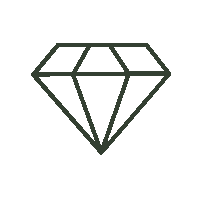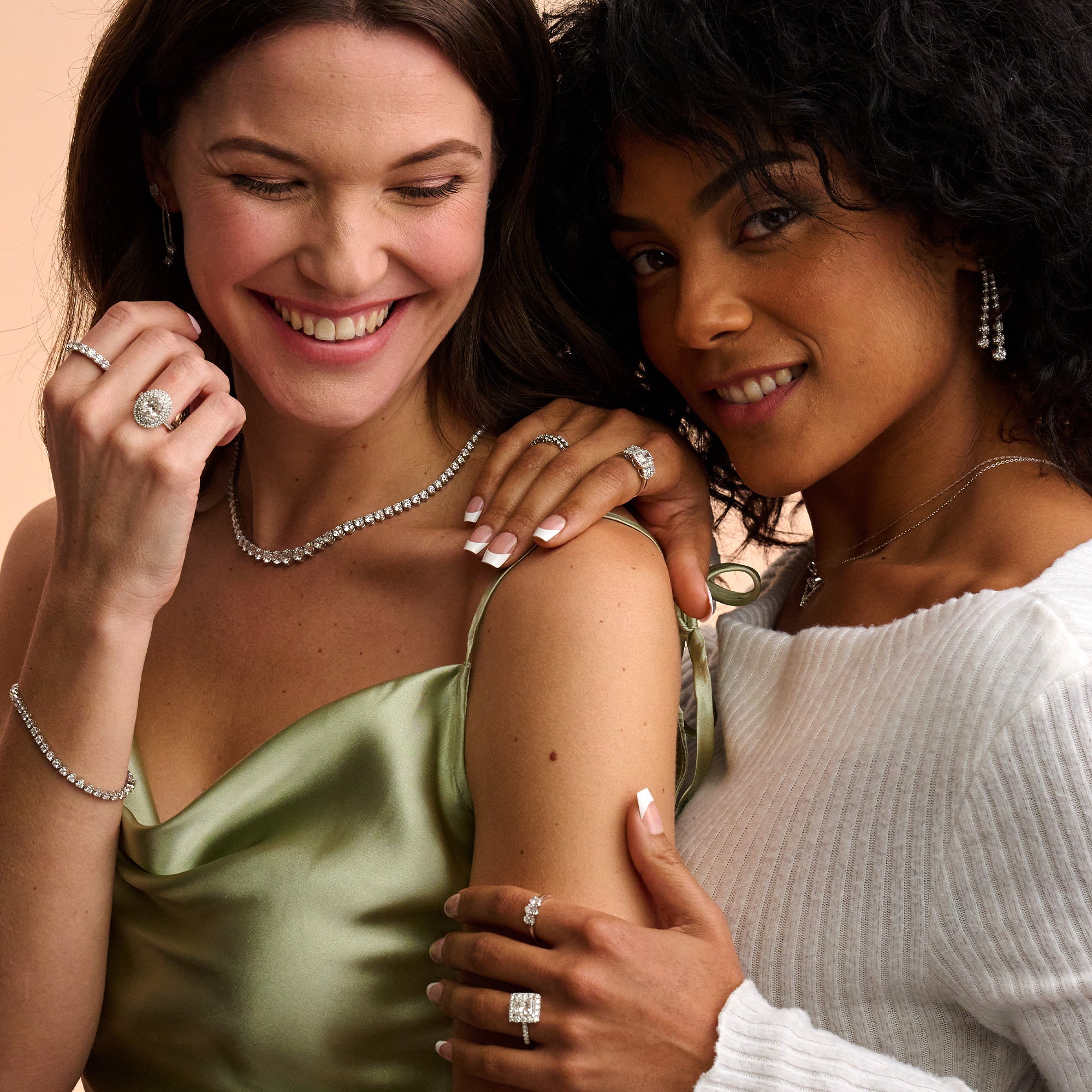When buying diamond jewelry, understanding the role of a certificate can help you make an informed decision. A diamond certificate, typically issued by reputable laboratories like GIA (Gemological Institute of America) or IGI (International Gemological Institute), provides detailed information about the quality and authenticity of the stone. However, it may not always be necessary, especially when purchasing lab-grown diamonds from a trusted retailer. This post will explain what a diamond certificate is, why you might want one, and what information it includes.

In this article you will learn about:
1. What Is a Diamond Certificate?
1.1 Is a diamond certificate important?
1.2 Do all diamonds have a certificate?
1.3 Do lab grown diamonds have certificates?
1.4 What does a (Lab) Diamond Certificate Look Like?
1.5 Diamond Certificate Explained
1.6 What does it mean for a diamond to be certified?
2.1 Leading Certification Bodies
2.2 List of other American organizations
2.3 Comparing Certifications & Finding the Best Certificate
3.1 How much does it cost to get a diamond certified?
3.2 How to get a diamond certificate?
4.1 What is a jewelry certificate?
4.2 Diamond appraisal vs Diamond certificate
5. Created Forever Lab grown diamonds
6.1 What is a diamond certificate?
6.2 What is a GIA diamond certificate?
6.3 What is an IGI diamond certificate?
6.4 What diamond certification is best?
6.5 Does a diamond certification matter?
6.6 Are certified diamonds worth more?
6.7 Should I buy a diamond ring without a certificate?
6.8 Does every diamond come with a certificate?
6.9 Do all diamonds come with a certificate?
6.10 Do small diamonds have certificates?
6.11 Why would a diamond not be certified?
6.12 Where can I get my diamond certified?
6.13 Do Created Forever diamonds come with a certificate?
6.14 Are Created Forever’s lab-grown diamonds of high quality?
6.15 What makes Created Forever diamonds different from mined diamonds?
1. What Is a Diamond Certificate?
A diamond certificate, also called a gem certificate or jewelry report, is a document provided by an independent laboratory that details a diamond's characteristics, including its carat, cut, clarity, and color. For lab-grown diamonds, certification serves the same purpose as for natural diamonds—verifying the stone's specifications and offering a reference for quality. While certificates are helpful, they are not always a deciding factor for buyers.
1.1 Is a diamond certificate important?
Authenticity & Peace of mind
A diamond certificate from a third-party organization provides official assurance of the diamond's quality and characteristics, offering verified and unbiased confirmation of its properties.
Seller Transparency
Requesting a diamond certificate or equivalent authentication documentation helps verify a vendor's credibility. This additional verification can help when making a significant purchase, ensuring you receive a genuine and accurately represented diamond.
Resale Value
A certificate can confirm a diamond's quality and authenticity, potentially improving its resale value. Diamonds with certificates from reputable labs like GIA, IGI tend to have higher resale values. You may need a diamond appraisal in addition to your diamond certificate.
Good to know: While a certificate helps maximize resale value, it's important to note that natural diamonds typically still sell for 20-60% of their original purchase price. Lab-grown diamonds typically have lower resale value (20% or less) due to their consistent production and lower manufacturing costs.
Consumer Considerations
Some buyers prioritize the certificate's detailed documentation, while others focus solely on the diamond's appearance and craftsmanship. While a certificate offers helpful insights, its necessity depends on your goals and priorities.
1.2 Do all diamonds have a certificate?
No, not all diamonds have a certificate. Especially smaller diamonds often don’t. But you can always send them to an institute to get them certified at cost. If you decide to purchase a Created Forever Diamond, you can reach out to us and we can either provide you with a certificate or a letter of authenticity.
1.3 Do lab grown diamonds have certificates?
In short: Yes. Lab created diamonds have certificates just as natural diamonds do too. Lab made diamond certificates will mention that the diamond is lab-grown. Both the GIA and IGI issue those certificates.
Did you know: Lab diamonds are real diamonds—chemically, physically, and optically identical to mined diamonds. They offer superior quality, greater affordability, and improved sustainability.
1.4 What does a (Lab) Diamond Certificate Look Like?
A typical diamond certificate, issued by respected laboratories like GIA or IGI, provides a professional summary of technical details, such as carat weight, clarity grade, and cut quality. It's a detailed report that validates key characteristics. Certificates for lab-grown diamonds will clearly state the diamond's lab origin while maintaining the same comprehensive assessment as certificates for mined diamonds.
Diamond certificate example
GIA Diamond certificate example
You can find an example of a GIA certificate here.
IGI Diamond certificate example
You can find an example link of a GIA certificate here.

1.5 Diamond Certificate Explained
Diamond certificates typically include:
-
The 4C’s: Carat weight, Clarity grade, Color Grade & Cut Grade
The diamond certificate is not a diamond value report. The diamond’s value is determined by its quality: The 4C’s. The higher the diamond scores, the more valuable it is, but its exact value depends on price fluctuations. Read more about the 4C’s below. -
Diamond Measurements & Size
The certificate details the proportions of the diamond, including its dimensions -
Shape and Cutting Style
This describes the diamond’s physical shape (e.g., round, oval, or princess) and cutting technique. It is distinct from the Cut Grade, which evaluates the quality of the diamond’s facets and angles. -
Inscription
If the diamond has a laser-engraved number the diamond’s girdle, it's mentioned here -
Specific Comments
Additional details about the lab-diamond, such as whether it was grown using the CVD (Chemical Vapor Deposition) process, may be included.
The 4C’s on the diamond certificate:
Diamond Cut refers to how well a diamond is shaped and polished to maximize its brilliance and sparkle. The higher the Cut Grade the higher the value. The scale ranges from poor to excellent/ideal.
Diamond Color alphabetically ranges from colorless (D) to yellow or brown (Z). The less color, the higher the grade and the value.
Diamond Clarity measures the presence of internal and external flaws. The clearer the diamond, the higher the grade, and the higher the value. The scale ranges for Flawless (F) over Very very Slightly Included (VVS) all the way down to Included (I).
Carat refers to how much the diamond weighs. Generally, the higher the carat weight, the higher the value.
1.6 What does it mean for a diamond to be certified?
A certified diamond has been evaluated by an independent gemological lab, which issues a document verifying its key characteristics, like carat, cut, clarity, and color. This certification ensures transparency and confirms the diamond's quality, offering buyers added confidence in their purchase.
For buyers, a certified diamond means you're getting an independent, professional verification of the diamond's quality and characteristics. Certification provides transparency and confidence in your purchase, offering:
-
Assurance of the diamond's actual specifications
-
Protection against misrepresentation
-
A reliable reference for value
-
An objective assessment that helps you make an informed buying decision
2. Who certifies diamonds?
An authentic diamond certificate provides an objective evaluation of a diamond’s quality and characteristics, offering buyers confidence in their purchase. In the United States, two major leading diamond certificate companies and various smaller companies provide these certificates.
2.1 Leading Certification Bodies
The Gemological Institute of America (GIA), founded in 1931, is renowned for establishing the universal diamond grading system and is considered the global gold standard for diamond certification. It is highly respected for its strict and consistent grading standards.
The AGS Laboratories (American Gem Society Laboratories) merged with GIA in late 2022, so they are no longer a separate certification entity.
The International Gemological Institute (IGI), established in 1975, has a strong global presence and is particularly recognized for its comprehensive grading reports, especially in the context of lab-grown diamonds. IGI is popular in international markets and has made efforts to enhance its grading standards over the past decade.
2.2 List of other American organizations:
The following list includes additional organizations in America that provide jewelry certificates. Please note that Created Forever does not guarantee the credibility, grading standards, or accuracy of these institutions.
-
AGI (Accredited Gemological Institute): Founded in 1981, AGI provides diamond grading reports and appraisal services, catering to smaller retailers and regional markets
-
GCAL (Gem Certification and Assurance Lab): Established in 2001, GCAL is a U.S.-based organization that offers diamond grading reports.
-
GSI (Gemological Science International): Founded in 2005, GSI provides grading reports for both natural and lab-grown diamonds.
-
PGS (Professional Gem Science Laboratory): A U.S.-based organization that offers diamond grading and appraisal services.
-
EGL USA (European Gemological Laboratory - USA): An independent branch of EGL, EGL USA offers diamond certification services specifically for the U.S. market, using standards that differ from EGL International.
2.3 Comparing Certifications & Finding the Best Certificate
Diamond certification IGI vs GIA
The International Gemological Institute (IGI) and the Gemological Institute of America (GIA) are two of the most recognized names in diamond certification. While both provide detailed evaluations of a diamond's quality, GIA is often considered the gold standard for its strict grading criteria and global reputation. IGI certificates, on the other hand, are more commonly associated with lab-grown diamonds and jewelry sold at competitive price points. Choosing between the two often depends on your priorities, whether it's stricter grading or more accessible certification.
Good to know
The IGI (International Gemological Institute) provides jewelry reports, which certify the entire piece of jewelry without requiring the diamonds to be removed.The GIA (Gemological Institute of America) only grades loose diamonds. To have a diamond graded by the GIA, it must first be removed from its setting.
Which diamond certificate is best?
The best diamond certificate depends on the reputation and credibility of the issuing organization. Renowned institutions like GIA and IGI are widely trusted for their consistent grading standards and global recognition. While smaller labs may offer more affordable certification options, their grading practices can vary. When choosing a diamond certificate, it's essential to research the organization's reputation and ensure their standards align with your needs.
3. Cost & Process
3.1 How much does it cost to get a diamond certified?
Good to know: The diamond certificate cost varies depending on the carat weight of the diamond. Generally, the larger the carat, the higher the diamond certificate price.
GIA Pricing:
A 1CT loose diamond report from the GIA currenlty costs $125 USD, their prices can be found on their Fee Schedule. However, it’s important to note that GIA only grades loose diamonds, so if your diamond is set in jewelry, you’ll need to have it unset by a jeweler at an additional cost.
IGI Pricing:
For a 1CT loose diamond report, IGI currently charges about $20 USD. You can also submit a whole piece of jewelry, but iyou will receive a different type of report. IGI’s diamond certification pricing can be found on their submission form.
3.2 How to get a diamond certificate?
With the GIA and IGI
If you are looking to get a diamond certificate from the GIA or IGI, you can apply for it online. For a diamond certificate, you will then send them the loose diamond. For the IGI you can also send the whole piece of Jewelry and get a jewelry certificate. You can also later lookup your certificate number by checking it on the website.
At created forever
At Created Forever you can rest assured that your diamond has been crafted with care and the highest quality. If you wish to get a certificate you can contact us and we will either provide you with a certificate from the IGI/GIA or with a letter of authenticity. If you wish to get additional certification, you can of course obtain a certificate, as described above. Feel free to contact us if you have any questions!
4. Other certificates
4.1 What is a jewelry certificate?
Are you looking for a certificate for a diamond ring, earrings, necklace or bracelet? There are diamond jewelry certificates! Similar to a diamond certificate, a diamond jewelry report provides information about the 4C’s (cut, color, clarity, carat) as well as information about the metal and other gemstones present.
Jewelry certificates are less common than certificates for loose diamonds. While IGI offers certification for entire pieces of jewelry, GIA does not provide this service and only certifies loose diamonds. Some individual diamond vendors, like Created Forever, may offer their own letter of authenticity and jewelry certificate for e.g. diamond rings or other jewelry.
4.2 Diamond appraisal vs Diamond certificate
A diamond appraisal and a diamond certificate serve different purposes. A diamond certificate is an objective report issued by a gemological laboratory, detailing the diamond’s characteristics like carat, cut, clarity, and color. In contrast, a diamond appraisal is a valuation conducted by a professional appraiser, typically for insurance or resale purposes, and includes the diamond's market value. While a certificate focuses on quality, an appraisal emphasizes monetary worth. Both can be useful, depending on your needs.
On the website of AGS, you can find certified jewelers to get a diamond appraisal for the piece you want to sell.
5. Created Forever Lab grown diamonds
Our lab-grown diamonds undergo rigorous testing to ensure exceptional quality. Every purchase includes an authenticity card for your peace of mind. If you’d like additional documentation, don’t hesitate to contact us—we’re happy to provide either a diamond certificate (if available for your specific piece of jewelry) or a letter of authenticity upon request.
6. FAQ
6.1 What is a diamond certificate?
A diamond certificate is a document provided by an independent laboratory that details a diamond’s characteristics, such as carat, clarity, color, and cut.
6.2 What is a GIA diamond certificate?
A GIA diamond certificate is a grading report issued by the Gemological Institute of America (GIA), a highly respected and globally recognized gemological laboratory.
6.3 What is an IGI diamond certificate?
An IGI diamond certificate is a grading report from the International Gemological Institute (IGI), another reputable gemological laboratory. IGI is known for certifying both loose diamonds and complete jewelry pieces.
6.4 What diamond certification is best?
The best certification depends on your needs. GIA is widely regarded for its strict grading standards, while IGI is known for affordability and jewelry certification. There are also smaller grading laboratories. In any case, make sure to check the reputation of your diamond grading organization of choice.
6.5 Does a diamond certification matter?
Certification matters for verifying a diamond’s authenticity and quality, which can be important for resale value, transparency, and peace of mind. Ultimately it is you choice if you want one, or not.
6.6 Are certified diamonds worth more?
Certified diamonds often have higher resale potential because their quality is verified. Certification is optional and it is the quality of the diamond that determines the price.
6.7 Should I buy a diamond ring without a certificate?
It's up to you! A certificate is not always necessary, especially for lab-grown diamonds purchased from reputable sellers. For jewelry with smaller diamonds, a diamond certificate may also not be necessary.
6.8 Does every diamond come with a certificate?
No, not all diamonds come with a certificate. Certification is typically optional and is more common for diamonds above a certain size.
6.9 Do all diamonds come with a certificate?
No, smaller diamonds or diamonds sold as part of jewelry may not always come with a certificate unless requested.
6.10 Do small diamonds have certificates?
Small diamonds, often called melee diamonds, usually do not come with certificates due to their size and the cost of the certificate.
6.11 Why would a diamond not be certified?
Certification or a document of authentication may not be provided for smaller or lower-value diamonds or if the buyer does not request or need one. For example if they are purchasing from a reputable seller and are not planning to resell their diamond.
6.12 Where can I get my diamond certified?
You can have your diamond certified by a gemological laboratory, such as GIA or IGI. At Created Forever, you can contact us and we will provide you either with a diamond certificate or a letter of authenticity.
6.13 Do Created Forever diamonds come with a certificate?
Created Forever provides an authenticity card with all purchases. Depending on the piece of Jewelry we can provide you either with the official Diamond Certification or a Created Forever document that proves authenticity. Please contact us to request certification.
6.14 Are Created Forever’s lab-grown diamonds of high quality?
Yes, Created Forever’s lab-grown diamonds are of exceptional quality, passing rigorous testing and evaluations to ensure customer satisfaction.
6.15 What makes Created Forever diamonds different from mined diamonds?
Created Forever diamonds are lab-grown, meaning they are identical to mined diamonds in quality and appearance but are more affordable, conflict-free, and sustainable.







